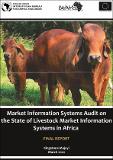| dc.contributor.author | AU-IBAR | |
| dc.contributor.author | Mujeyi, Kingstone | |
| dc.contributor.editor | Patricia Mweene, Lumba | |
| dc.coverage.spatial | KENYA | en |
| dc.date.accessioned | 2022-10-14T09:06:30Z | |
| dc.date.available | 2022-10-14T09:06:30Z | |
| dc.date.issued | 2022-03 | |
| dc.identifier.uri | http://repository.au-ibar.org/handle/123456789/1369 | |
| dc.description | State of Livestock Market Information Systems | en |
| dc.description.abstract | Majority of African livestock farmers are older smallholders living in isolated rural areas and thus
lack appropriate access to markets for their products and they are also deprived of agricultural market
information. As they lack these, the smallholder livestock producers have no adequate information
on demand and supply, what to produce and when, and therefore can be exploited by other actors
in the chain and receive low prices for their agricultural produce. | en |
| dc.description.sponsorship | European Union | en |
| dc.format.extent | 52 Pages | en |
| dc.language.iso | en | en |
| dc.publisher | AU-IBAR | en |
| dc.subject | Live2Africa | |
| dc.subject | Animal Health | |
| dc.subject | Livestock Development | |
| dc.subject | LiDeSA | |
| dc.title | Market Information Systems Audit on the State of Livestock Market Information Systems in Africa | en |
| dc.type | Report | en |
